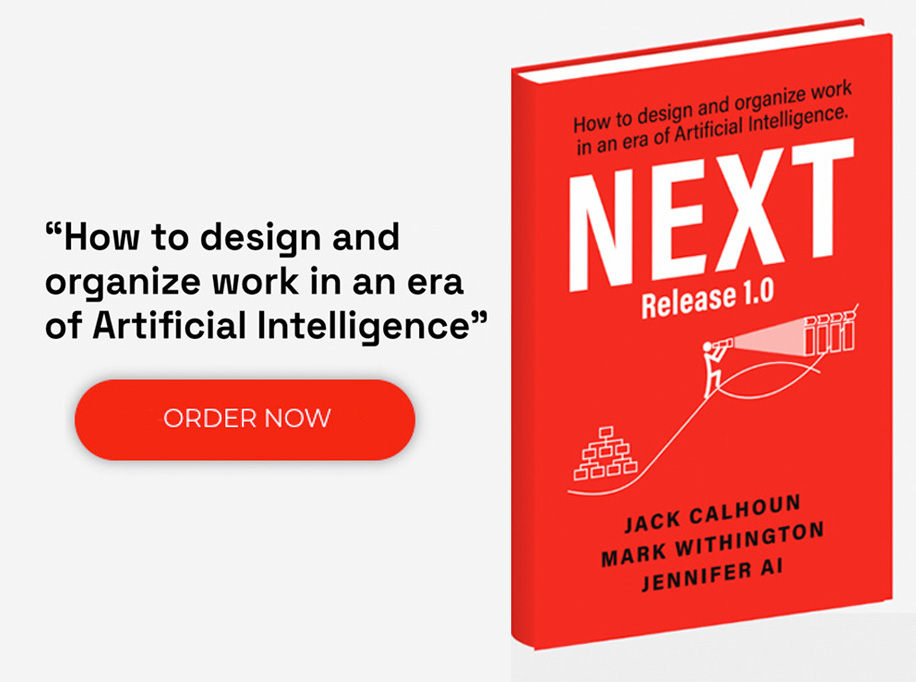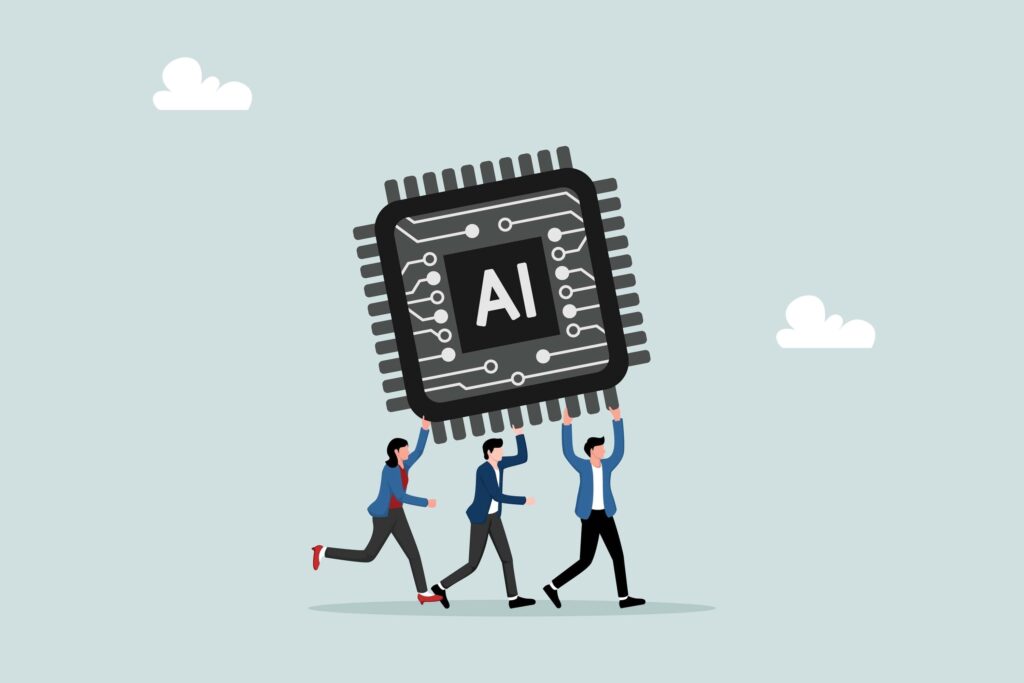Customer experience (CX) is the critical element of differentiation for most organizations. Yet, it often remains an ill-defined series of interactions between the customer and the organization. Furthermore, parsing those interactions across the org chart results in fragmented customer journeys with poor handoffs between departments. In this guide, we discuss customer experience and AI, covering the importance, benefits, and challenges many organizations face. We conclude by sharing our expertise and discussing our AI and customer experience solutions.
Understanding Customer Experience in the Age of AI
Why are bad customer experiences so common? Because, unfortunately, most organizations unwittingly parse the end-to-end customer journey into the departmental silos, fragmenting the journey and then too heavily relying on a customer-service center at the end of a poorly designed process.
This is where AI enters the picture. When successfully implemented, AI technologies can bridge these departmental gaps by providing a consistent, data-driven approach to understanding and serving customers across their entire journey. Rather than forcing customers to navigate the maze of your organizational structure, you can leverage AI tools to create a seamless experience that feels cohesive and intentional. AI tools also free up team members from mundane digital tasks so they can focus on the more relational, customer-centric initiatives.
The Importance of AI in Customer Experience
The digital transformation of customer experience isn’t optional—it’s essential for survival. The best next-generation innovations and ideas coming to your industry should come from your own business by applying new technologies like AI to your industry. You need to be the driving force in transforming to your next-generation business model. If you don’t use emerging technologies like AI to proactively transform your business model and your customer experience, you will be left behind.
The key question for leadership is where and how to apply AI in both current and future business models. AI can and should be applied to both. However, most businesses do not have either the As-Is or To-Be processes of their business known, labeled, or designed. Most businesses still use a hierarchical organization chart to model and govern work, and the processes are marbled-in, opaque, and have never been designed end-to-end in support of the customer.
AI offers a powerful solution by:
- Providing real-time insights into customer behavior and preferences
- Identifying patterns and trends that human analysts might miss
- Enabling personalization at scale across all touchpoints
- Automating routine interactions while enhancing more complex ones
- Creating a consistent experience regardless of channel or department
By leveraging AI strategically, organizations can create truly exceptional customer experiences—experiences that build loyalty, drive advocacy, and create sustainable competitive advantage.
5 Key Benefits of AI in Customer Experience
Integrating AI into customer experience management offers numerous benefits that can transform how organizations interact with their customers. Based on recent research and consumer feedback, here are the top five benefits of AI in customer experience:
Benefit 1: Timely Response and Service
According to a 2024 survey carried out in the United States, one-third of consumers thought generative AI tools could provide more timely responses to their requests. Unlike human agents who need breaks, vacations, and sleep, AI assistants are always available to address customer queries and concerns, ensuring that customers receive prompt attention whenever they need it.
Benefit 2: Enhanced Personalization
AI can analyze vast amounts of customer data to deliver hyper-personalized experiences, recommendations, and communications that resonate with individual preferences and behaviors. Consumers are starting to notice. 15.3% of consumers in a 2024 U.S. survey mentioned receiving more personalized experiences as a benefit of AI in shopping.
Benefit 3: Better Product Discovery
AI algorithms excel at analyzing customer behavior patterns to recommend products and services that align with individual preferences, significantly enhancing the discovery process. 25.99% of consumers surveyed in 2024 said AI can help find more relevant items. Through machine learning and predictive analytics, AI can understand not just what customers have purchased in the past but what they might be interested in purchasing in the future based on similar customer profiles, browsing behavior, and market trends.
Benefit 4: Cost Efficiency
AI automation is ideal for handling routine inquiries, freeing human agents to tackle more complex issues requiring empathy and creative problem-solving. By automating repetitive tasks and streamlining processes, AI can help organizations do more with less, improving both efficiency and effectiveness.
Benefit 5: Better Deals and Value
AI systems can analyze pricing patterns, inventory levels, and customer preferences to offer timely discounts and promotions that provide better value to customers. 29.65% of consumers in a 2024 survey said AI could help find better deals. By understanding individual customer preferences and purchase history, AI can deliver personalized offers that are more likely to resonate with each customer.
These benefits illustrate how AI pushes customer experience to evolve from a reactive, laborious approach to a proactive, personalized, and efficient model that creates value for both customers and organizations.
Common AI and Customer Experience Challenges
While AI offers tremendous potential to transform the customer experience, organizations must navigate several challenges to realize these benefits fully.
Generational Gap in AI Acceptance
A 2024 survey carried out in the United States showed that consumers aged over 50 tend to dislike AI-powered customer service. Notably, 50% of shoppers aged 50 to 54 stated that using AI chatbots for customer support instead of humans could negatively impact their perception of a brand or retailer. In contrast, only 30% of shoppers aged 18 to 24 had the same opinion.
AI Hallucinations
AI hallucinations refer to instances where an AI model generates incorrect or misleading information that is not grounded in reality. These outputs can manifest as factual errors, invented information, or logical inconsistencies. Inaccurate or misleading information can lead to poor decision-making, erode trust in AI systems, and even cause harm.
Consumer Skepticism
A 2024 survey carried out in the United States showed that only nine percent of shoppers believed artificial intelligence improved their shopping experience. According to most surveyed consumers, AI’s impact on the shopping experience depends on how the technology is used (56.45% of respondents answered this way).
Fragmented Implementation
One of the most important and well-suited areas to apply generative AI is in the definition of the enterprise’s As-Is and To-Be process models. A fragmented approach to AI implementation can result in disconnected experiences, inconsistent messaging, and missed opportunities for cross-functional insights.
Balancing Automation with Human Touch
Customers often expect a blend of efficiency and empathy in their brand interactions. AI can handle routine queries and transactions efficiently, but human agents bring emotional intelligence, creativity, and adaptability to complex or sensitive situations. The key is to design customer journeys that seamlessly integrate both AI and human elements, leveraging the strengths of each to create exceptional experiences.
AI in Customer Experience Use Cases
Here are some key use cases that demonstrate the power of AI in enhancing customer experience:
Marketing Automation
AI-powered marketing automation helps organizations deliver personalized marketing messages at scale, targeting the right customers with the right offers at the right time. In the United States, most retail companies are likely to use artificial intelligence for marketing purposes. Nearly 49% of professionals from retail companies answering a survey in 2024 stated that their enterprises will be using AI to handle marketing automation.
Chatbots and Virtual Assistants
AI-powered chatbots and virtual assistants provide immediate, 24/7 support to customers, answering queries, resolving issues, and guiding them through the customer journey. 31.4% of retail professionals in a 2024 survey indicated their companies would be using AI for chatbots and virtual shopping assistants. The number of U.S. shoppers using chatbots went from 18% in 2023 to 24% in 2024, showing growing adoption.
Strategic Planning Support
Generative AI is particularly well-suited for a number of the business’s meta (planning and design) processes, including the Strategy-to-Execution Process, Operating Model Design, Project Planning and Execution, and across the entire Systems Development Life Cycle (SDLC). These processes create the context for operational processes and create the roadmap for how AI can be applied across both the As-Is and To-Be business models.
Process Definition and Optimization
AI can analyze existing processes, identify bottlenecks and inefficiencies, and recommend improvements that enhance the customer experience. Generative AI can be a deep expert “who” is a key advisor and researcher supporting the Strategic Planning, Operating Model Design, and Systems Development process.
Augmented Decision-Making
AI algorithms can analyze complex datasets, identify patterns, and predict future outcomes with increasing accuracy. In customer experience management, AI-powered decision support can help organizations understand customer preferences, predict behavior, and optimize interactions to maximize satisfaction and loyalty.
Persona Development and Empathy Mapping
Personas address a fundamental challenge in CX design: the tendency to view customers as a homogenous group rather than unique individuals with distinct needs and motivations. By using AI tools to create detailed, data-driven representations of your ideal customers, organizations can move beyond broad demographics and better understand their goals, pain points, and behaviors.
Simplify AI in Customer Experience with Accelare
Integrating AI into your customer experience strategy can be challenging. Accelare simplifies this process with our proven methodology and expert guidance.
Accelare’s Purpose Driven Customer Experience (PDCX) leverages traditional CX design tools coupled with the concept of behavioral economics to develop a Choice Architecture that maps to the operating model vs. the org-chart to promote a mutually beneficial outcome to build CSat and NPC.
Our approach involves a hands-on, client-focused effort driven by an outside-in perspective. We help you identify the most strategic applications of AI for your unique business context, ensuring that your investments deliver meaningful improvements in customer experience and business outcomes.
With Accelare as your partner, you can confidently navigate the complexities of AI-enabled customer experience, leveraging our expertise, methodology, and tools to create exceptional experiences that drive loyalty, advocacy, and sustainable growth.
Take our 4-minute CX Journey Assessment to start your transformation today.











